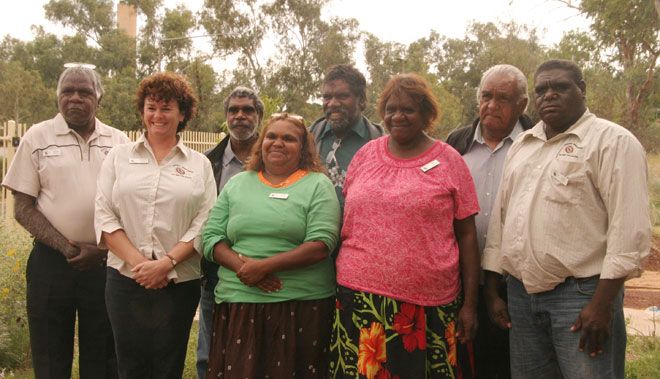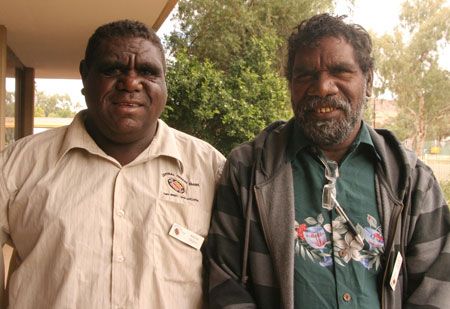Vast geographic scale dwarfs shire budgets
13 April 2012

By KIERAN FINNANE
• Just $1.5 million over 5 years for roads maintenance across 280,000 sqkm
• Council can enact by-laws but does not have the resources to enforce them
• Shire office in ‘Growth Town’ really a tin shed
A reduced Central Desert Shire Council got down to business yesterday at its first ordinary meeting since the local government elections. The council is missing three members from the Anmatjere Ward but supported this ward’s sole councillor, Adrian Dixon, to become the new shire president. Former president Norbert Patrick from Lajamanu declined nomination for the top job but accepted the deputy president role.
Cr Dixon told the Alice Springs News Online that he is confident candidates will come forward to fill the vacancies in his ward. It appears there was confusion at the last minute over nominations.
Southern Tanami Ward now has two representatives from Yuendumu, the ward’s largest community, and one each from Nyirripi and Willowra. They are, respectively, Robert Robertson, Georgina Wilson, Jacob Spencer and April Martin. This reflects a wider geographic spread within the ward, a desired result of changes to the vote counting system.
While Cr Spencer had been present at earlier preparatory meetings of the council this week, he was absent without an apology yesterday.
During the meeting, held at the Alice Springs head office, shire CEO Roydon Robertson poured cold water on the Country Liberals’ approach to the future of the shires, expressed in a letter to him from the Leader of the Opposition, Terry Mills, and Shadow Minister for Indigenous Policy, Adam Giles, dated March 29. It suggested, based on advice from the Country Liberals’ MacDonnell MLA Alison Anderson and candidate for Stuart Bess Price, that some shires perform better than others and need no change. For those who are pressing for change, the Country Liberals will support the establishment of new regional councils, smaller than the current shires and with their head offices located within their boundaries. “This would bring decision-making back to a local level and increase the provision of services,” said the letter, without specifying which shires were concerned.
“They don’t know what they want to do,” scoffed Mr Roberston, “they just want to do something to discredit the government.”
No councillor demurred. Cr Liz Bird suggested that the council write back to find out if some shires will be treated differently from others and how that will affect Central Desert Shire.
The government’s answer to the problem of vast geographic scale in the shires is to strengthen local boards, as stressed by the department’s Robert Kendrick when he addressed councillors after their swearing-in.
There was a fair bit of evidence at the meeting of this structure being an effective way to at least bring issues to the table.
Chairman of the Laramba Board, Andrew Campbell, has asked council to lobby the Minister for Police to get an extra police officer and an auxiliary stationed at Ti Tree. The issues are familiar: calls to police from the community “invariably” get diverted to Darwin and on occasion to Yuendumu.
“If the calls could have been picked up by Ti Tree based police officers then a lot of time and effort spent explaining where Laramba was, who the people they were talking to are, and explaining geography and community dynamics would not be necessary”, said Mr Campbell in the supporting reasons for his recommendation.
A chorus of complaint erupted around the table: the problems are the same at Harts Range – “If there’s trouble at Engawala, quite often it rings out,” said Cr Bird; at Yuendumu – “When you call you get someone from Darwin,” said Cr Roberston; at Lajamanu – “You call Darwin for something that’s happening next door,” said Cr William Johnson.
Cr Bird said the letter to the Minister should say that the problems are experienced throughout the “whole shire”.
Chairman of the Anmatjere Local Board, Rodney Baird, requested that council develop an animal management by-law to restrict dog ownership to two animals per household.
Here, as with so many items on community wish lists, the shire came up against the issue of resources. The shire has a two dogs per household policy; it also has the power under the Local Government Act to enact by-laws; but it does not have the resources to enforce them. So all it can do is to encourage compliance through education.
 Chair of the Lajamanu Board, Sharon Anderson-Long, requested that the council build a new shire office in the community. Cr Patrick, who lives in Lajamanu, spoke to her recommendation: “Lajamanu is a Growth Town. If you want to be a Growth Town you need to have a new shire office. ” At the moment the office is really just a “tin shed”. Cr Johnson, also from Lajamanu, joined in: “Yuendumu has a flash one, why don’t we?”
Chair of the Lajamanu Board, Sharon Anderson-Long, requested that the council build a new shire office in the community. Cr Patrick, who lives in Lajamanu, spoke to her recommendation: “Lajamanu is a Growth Town. If you want to be a Growth Town you need to have a new shire office. ” At the moment the office is really just a “tin shed”. Cr Johnson, also from Lajamanu, joined in: “Yuendumu has a flash one, why don’t we?”
It would be nice but it would be committing the shire to huge expenditure of money it doesn’t have, cautioned Mr Robertson. Councillors accepted, with good grace, an alternative recommendation that the issue be investigated and options considered.
Cr Roberston got further with the recommendation from the Yuendumu Local Board that council repair the corner of Tanami and Conniston Roads, which gets flooded when it rains. As it’s on the main way to the shop, that’s a real “headache”, he said. Repairs are on track, advised Glenn Marshall, council’s director of works. The only money council has for road maintenance is $1.5m over five years (with three remaining) from the federal Roads to Recovery program. $80,000 from that fund has been allocated to repair the corner in question, and the work should be completed within six weeks, with some labour supplied by CDEP workers.
Cr Roberston then raised another issue from the board, the Yuendumu heavy vehicle bypass road, which is also impassible after rain.
Mr Marshall acknowledged the broad stormwater drainage issues in the community, which are partly to blame on its main drains being around the perimeter, making it difficult for stormwater to get away. Correcting this would cost millions, explained Mr Marshall, and even a culvert on the by-pass road would cost at least $300,000. With the other demands on a limited budget that is not going to happen soon, but a 10 year plan prioritising roadworks is being drawn up, he said. Cr Roberston nodded his acceptance.
Some local boards struggle, however. While Atitjere has an effective voice at meetings in Cr Bird, who raised a number of community issues during the meeting and had questions about reports from the executive, the meeting papers noted that the Atitjere local board failed to meet quorum twice and a community meeting to discuss the issues was poorly attended.
The Engawala local board had also failed to meet quorum as had the Willowra board, although there a meeting went ahead and minutes were provided. Sometimes it’s a matter of re-scheduling meetings, which can fail for all sorts of reasons – bad weather, men’s business were cited. At Lajamanu training was held on February 27, with a meeting due the next day but it failed to meet quorum. Rescheduled for March 6, it was successful. Yuendumu board rescheduled twice and was successful the third time. Nyirripi, Laramba, Anmatjere and Yuelamu had also had successful meetings.
Further training sessions for local boards are scheduled in communities throughout the shire over the coming months.
UPDATE:
Shadow Minister for Indigenous policy Adam Giles says the Country Liberals will not be prescriptive about changes to the shires. He would not be drawn on which shires may be considered to be performing less well than others.
He says the Country Liberals have received complaints about shires from right across the Territory. If elected to government they will look at the performance of the shires and will listen to what people want. There could be changes to some shires or even no change at all.
He says he is particularly concerned that all shire headquarters are based in the main urban centres rather than within shire boundaries (Alice houses the headquarters for both MacDonnell and Central Desert).
“If you represent a region, you should invest in that region,” he says.
“The same goes for the NT Government with centralisation to Darwin. Look at what that does to Alice Springs.”
Pictured, top: The new council, from left, Cr William Johnson, Cr Liz Bird, Cr Robert Robertson, Cr Georgina Wilson, Deputy President Norbert Patrick, Cr April Martin, Cr Louis Schaber, President Adrian Dixon. (Absent, Cr Jacob Spencer) • Above: New president, Adrian Dixon (left), with former president Norbert Patrick who will now be his deputy.


